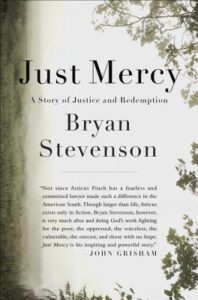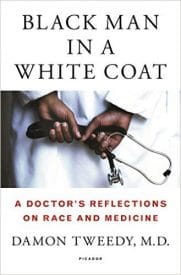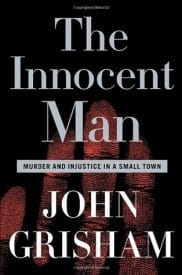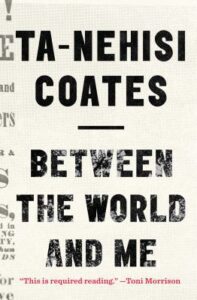Title: Just Mercy: A Story of Justice and Redemption
Author: Bryan Stevenson
Page Count: 349 pages
Genre: Nonfiction, Memoir, Call-to-Action
Tone: Inspiring, Explanatory, Sympathetic
Summary:
The founder of the Equal Justice Initiative in Montgomery, Alabama recounts his experiences as a lawyer working to assist those desperately in need, reflecting on his pursuit of the ideal of compassion in American justice.
SPOILER WARNING:
These book discussion questions are highly detailed and will ruin plot points if you have not read the book.
The Library is happy to share these original questions for your use. If reproducing, please credit with the following statement: 2016 Mount Prospect Public Library. All rights reserved. Used with Permission.
1. Is there anything about which you think or feel differently as a result of reading Just Mercy?
2. Who would you say is the center of this book: Bryan Stevenson or Walter McMillian?
3. Which details of Walter’s case were most difficult for you to accept? Was it difficult to believe that this could really happen?
4. What was your reaction to the fact that Walter’s case took place in Monroeville? How could the very residents who romanticized Harper Lee’s To Kill a Mockingbird stand for (or, worse, contribute to) Walter’s trials?
5. In which aspects was Walter’s case the ideal choice to use as the focus of the book? Would a case with a less flagrant miscarriage of justice have been a better way to test the author’s convictions?
6. Are the cases used as examples more about race or about poverty? In your opinion, is that a worthwhile question to ask?
7. Stevenson laments that “the opposite of poverty is not wealth; the opposite of poverty, in too many places, is justice.” How do you feel when you read those words?
8. Do you agree that “wealth, not culpability, shapes outcomes” in our justice system?
9. Critics of social justice initiatives complain that too many excuses are being made for those who have done wrong. What relevance might this opening line from The Great Gatsby have in the debate over this issue: “whenever you feel like criticizing anyone… just remember that all the people in this world haven’t had the advantages that you’ve had”?
10. How do cases such as Herbert Richardson’s, the man who set a bomb that killed a young girl, test these convictions?
11. Do you believe as Stevenson does, that we are more than the worst thing we have ever done? What effect, if any, should that belief have on the justice system?
12. One of Stevenson’s persistent talking points is that the question is not whether the condemned deserves to die but whether we deserve to kill. How does he explain this? Do you find this compelling?
13. Do you agree that the character of a nation is determined by how it treats the broken, the poor, the oppressed? Is this realistic?
14. In your opinion, is Stevenson against individuals accepting responsibility and/or consequences for their actions? Is there a middle ground?
15. Which other cases were memorable for you? Were you angry? Saddened? Did any moments bring satisfaction?
16. This book is often characterized as a memoir. Does that surprise you? In what ways does it fit that category?
17. What is your opinion of Stevenson as a “character”? Do you feel you know him? Do you understand him?
18. Did you notice the alternating structure of the book in which chapters about Walter’s case were followed by chapters on cases which illustrated different issues? What might the thinking behind that have been? Was it effective?
19. What does it mean to be a “stonecatcher”? What are the implications, both positive and negative?
20. Were you satisfied with the amount of time devoted to how the court system deals with mental illness, women, and children? Are you inspired to learn more?
21. Consider the title. What did you take it to mean before you read and/or what does it mean to you now?
22. The title appears specifically in two passages (p. 294 and p. 314). What is the context? Why “just” mercy in each instance?
23. When asked what effect he hoped Just Mercy would have on readers, Stevenson replied
I hope it makes people more thoughtful about our criminal justice system and the need to prioritize fairness over finality, justice over fear and anger. Many of the problems I describe exist because too many of us have been indifferent or disinterested in the poor and most vulnerable among us who are victimized by our system…
Looking at your own response, did Stevenson achieve his goal? What do we do with ourselves after reading a work such as this?
Want help with your book discussion group? Check out tips, advice, and all the ways the Library can help support your group!
OTHER RESOURCES:
- Official Just Mercy website, including detailed Discussion Guide and opportunities to Get Involved
- Walter McMillian feature on 60 Minutes
- Bryan Stevenson TED talk: We Need to Talk About an Injustice
- The New York Times review of Just Mercy
- NPR interview with author Bryan Stevenson
- Equal Justice Initiative website
- Discussion guide from University of Wisconsin-Madison Go Big Read program
- When Stevenson received the Andrew Carnegie Medal for Excellence in Nonfiction, Publishers Weekly asked: Is This the Greatest Book Award Acceptance Speech Ever?
READALIKES:
The Innocent Man: Murder and Injustice in a Small Town
by John Grisham
Between the World and Me
by Ta-Nehisi Coates





